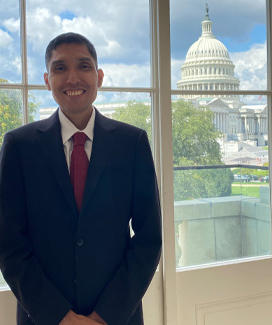Neurological Surgery Resident appointed 2024 – 25 White House Fellow
 Alexander Tenorio, M.D., a fifth-year neurological surgery resident at the University of California San Diego School of Medicine has been appointed a 2024-25 White House Fellow. He will work with the Department of Veterans Affairs during his fellowship.
Alexander Tenorio, M.D., a fifth-year neurological surgery resident at the University of California San Diego School of Medicine has been appointed a 2024-25 White House Fellow. He will work with the Department of Veterans Affairs during his fellowship.
The White House Fellowship is a prestigious program designed to nurture future leaders through hands-on experience in government. As a White House Fellow, Tenorio will be working alongside dedicated leaders to enhance the lives of veterans.
Prior to becoming a White House Fellow, Tenorio led a research team investigating neurological traumatic injuries at the U.S.-Mexico border. His work has been covered by the Los Angeles Times and New York Times. Tenorio also champions health equity, by partnering with Hospital General de Tijuana in Mexico to improve their neurosurgical care.
Colleagues and mentors at UC San Diego have praised Tenorio for his remarkable advocacy work and his ability to bridge the gap between medicine and policy.
“Alex Tenorio is a great example of someone taking the passion of their experience and life story and applying it to make the world better for others,” said Alexander Khalessi, M.D., professor of neurological surgery, radiology and neurosciences and chair for the Department of Neurological Surgery.
The fifth year of UC San Diego’s neurological surgery residency program includes a dedicated year for research, allowing trainees to pursue their areas of interest. Tenorio is using his research year to complete the fellowship. He recently shared what he hopes to achieve as White House Fellow and how his time at UC San Diego has helped shape his advocacy work.
Why did you apply to become a White House Fellow?
This is a unique experience that would allow me to participate in government policymaking and implementation at the highest levels on a national scale. As the son of Mexican immigrants, I hope to use this experience to continue advocating for our most underserved and underprivileged communities.
What role has UC San Diego played in your appointment as a White House Fellow?Public health research is not as common within our specialty. I am deeply grateful to have a residency program that has supported my unique journey and encouraged me to pursue this path. Dr. Khalessi has provided me the support and mentorship that has been invaluable to my professional and personal development. This is what makes UC San Diego neurosurgery one of the best training programs in the country.
As a White House Fellow, what do you hope to get out of the experience?I hope to further develop my leadership and policymaking skills to continue advocating for our most underserved patients.. Moreover, I hope to develop a network that will support me in my advocacy efforts once I leave Washington D.C.&
What do you believe are some of the main challenges of your work?One of the main challenges will be the work environment. As a neurosurgery resident, I am accustomed to being in the operating room most days. Wearing a suit and going into an office will be quite the change of pace.
What advice would you give to medical students and future residents at UC San Diego or other institutions who are interested in combining clinical practice with advocacy work on a national scale?Our program really allows you to carve your own path and supports you in your endeavors. I would advise medical students and future residents to choose a mentor who will not only allow you to develop your own platform but will provide you with opportunities to continue shining a light in your successes. This has been critical in my development. Furthermore, collaborating with community partners is key in the advocacy space, particularly for physicians.
— Justin Covington
Digital Communication Specialist, Neurological Surgery